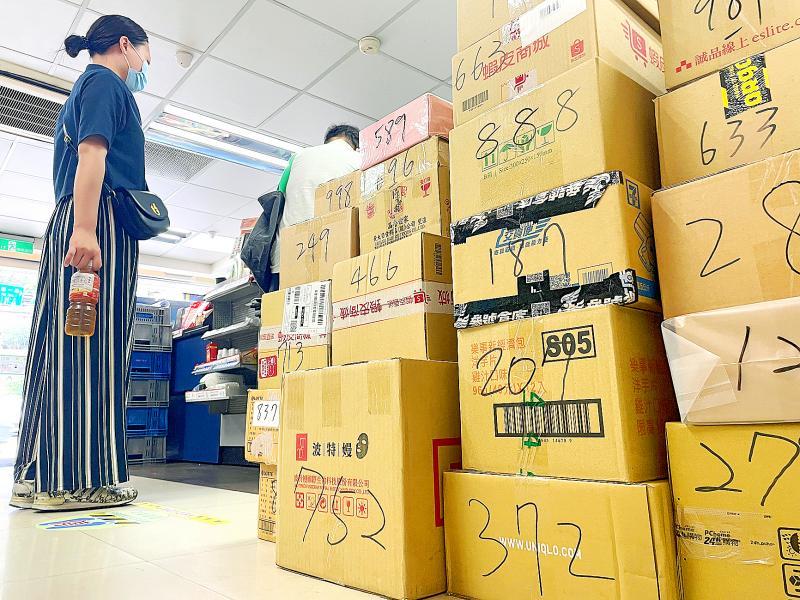Chunghwa Post is to temporarily stop sending packages to the US starting tomorrow, as Washington is set to end its tax exemption on items less than US$800.
Following an executive order signed by US President Donald Trump on July 30, the US on Friday is to universally stop the “de minimis” exemption under which packages worth less than US$800 may enter the US duty-free.
As there is currently no system in place anywhere in the world to collect tax payments from the sender, Chunghwa Post is to temporarily halt shipments of merchandise to the US, it said in a statement today.

Photo: CNA
Letters and other types of paper items would not be affected, it said.
Senders may still use third-party services such as DHL or FedEx to ship packages to the US, the postal service said.
The types of packages affected include anything that has commercial value, including items purchased on e-commerce sites or gifts to be sent to friends and family.
Chunghwa’s deputy chief of mail business and operations Lin Li-fu (林立富) said that most items sent to the US fall under the “de minimis” rule, and any additional taxes incurred are paid by the recipient.
However, the change would require taxes to be paid upon arrival in the US, he said, adding that the timeframe is too short to implement the required logistics to make this possible.
As there is currently no standard for collecting tax from the sender, it is impossible to make the change fast enough, he said, but added that Chunghwa is evaluating how to reinstate the service.
Although third-party businesses are still offering shipping services, the pricing would change perhaps by the week and might be more expensive, Lin said.

The Coast Guard Administration (CGA) yesterday said it had deployed patrol vessels to expel a China Coast Guard ship and a Chinese fishing boat near Pratas Island (Dongsha Island, 東沙群島) in the South China Sea. The China Coast Guard vessel was 28 nautical miles (52km) northeast of Pratas at 6:15am on Thursday, approaching the island’s restricted waters, which extend 24 nautical miles from its shoreline, the CGA’s Dongsha-Nansha Branch said in a statement. The Tainan, a 2,000-tonne cutter, was deployed by the CGA to shadow the Chinese ship, which left the area at 2:39pm on Friday, the statement said. At 6:31pm on Friday,

The Chinese People’s Liberation Army Navy’s (PLAN) third aircraft carrier, the Fujian, would pose a steep challenge to Taiwan’s ability to defend itself against a full-scale invasion, a defense expert said yesterday. Institute of National Defense and Security Research analyst Chieh Chung (揭仲) made the comment hours after the PLAN confirmed the carrier recently passed through the Taiwan Strait to conduct “scientific research tests and training missions” in the South China Sea. China has two carriers in operation — the Liaoning and the Shandong — with the Fujian undergoing sea trials. Although the PLAN needs time to train the Fujian’s air wing and

STRIKE: Some travel agencies in Taiwan said that they were aware of the situation in South Korea, and that group tours to the country were proceeding as planned A planned strike by airport personnel in South Korea has not affected group tours to the country from Taiwan, travel agencies said yesterday. They added that they were closely monitoring the situation. Personnel at 15 airports, including Seoul’s Incheon and Gimpo airports, are to go on strike. They announced at a news conference on Tuesday that the strike would begin on Friday next week and continue until the Mid-Autumn Festival next month. Some travel agencies in Taiwan, including Cola Tour, Lion Travel, SET Tour and ezTravel, said that they were aware of the situation in South Korea, and that group

Taiwanese celebrities Hank Chen (陳漢典) and Lulu Huang (黃路梓茵) announced yesterday that they are planning to marry. Huang announced and posted photos of their engagement to her social media pages yesterday morning, joking that the pair were not just doing marketing for a new show, but “really getting married.” “We’ve decided to spend all of our future happy and hilarious moments together,” she wrote. The announcement, which was later confirmed by the talent agency they share, appeared to come as a surprise even to those around them, with veteran TV host Jacky Wu (吳宗憲) saying he was “totally taken aback” by the news. Huang,